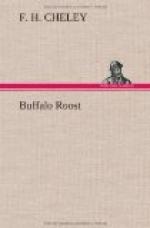The hearth at once became the center of attraction. It was the mysterious fairy that bound all hearts together and welded all types of personality into a sympathetic friendship that gathered round it. It was the stern and fiery monarch, ordering all assembled to be quiet that it might sing and moan and whisper the messages that it had gathered from the winter storms or from the falling leaves.
At one side of the old fireplace, leaning back in his rickety old arm-chair, sat Ben, Old Ben the innkeeper, his long-stemmed cob pipe held quietly in one hand, while the other rested on the head of a huge Russian hound that lay on the floor in front of the fire. Ben’s hair was long and gray, and on his nose rested a pair of large, old—fashioned, silver—rimmed spectacles. His head was partly bald, and his small, gray eyes were set well back under shaggy eyebrows. His face was covered with a generous growth of dirty-gray whiskers, stained darkly about the mouth from his pipe. He was a typical old mountain prospector who had seen better days.
As the boys entered Old Ben rose, stretched his large, gaunt frame, and cried, “Howdy, fellers, must o’ started day afore yestedy, didn’t ye? Took ye tarnal long to git here, anyhow. Supper’s ben ready these two hours. Me’n the critter ‘n Tad is most starved a waitin’. Hello, Mr. Allen, where’d ye git this lively bunch o’ fellers, anyhow? D’ they all b’long to ye? Come along, Tad, er these dratted youngsters ’ll eat all yer grub fer ye.” This as the fellows seated themselves about the table.
Tad, by the aid of a crutch, hobbled from the lean-to kitchen and took his seat at the table nearest the fire. Old Ben served the meal—beefsteak, baked potatoes, hot corn muffins, and gravy, apple sauce, pickles, and coffee that fairly filled the room with its fragrance.
“Drat me for a young squirrel if you fellers ain’t the hungriest bunch o’ yearlin’s I ever set eyes on,” muttered Ben as he hurried back and forth from table to kitchen supplying the urgent demand.
After the last drop of coffee had disappeared, the meeting was called to order around the table and the business of the evening was gotten under way. Willis, for the first time, found it difficult to pay attention to what Allen had to say. He was watching Old Ben and his friend as they sat by the fire, chatting and smoking, the very picture of contentment. Now and then a little of their conversation would reach him, but he could not make head nor tail of it. At the supper table the man with the crutch had eyed Willis many times. In his manner there was something that seemed to be so very familiar, yet his face, which was covered with a several weeks’ beard, was strange to Willis.
“I never saw a face so like my old pard’s,” the stranger was saying to Ben. “And you know, Ben, I often wonder if some day I won’t hear something from Bill’s family. There was a wee boy, but what others, if any, I don’t know. The day of the wreck I saw a lad that did a brave deed, and ever since I’ve been wondering if he might be Bill’s boy—he looked so like him.”




